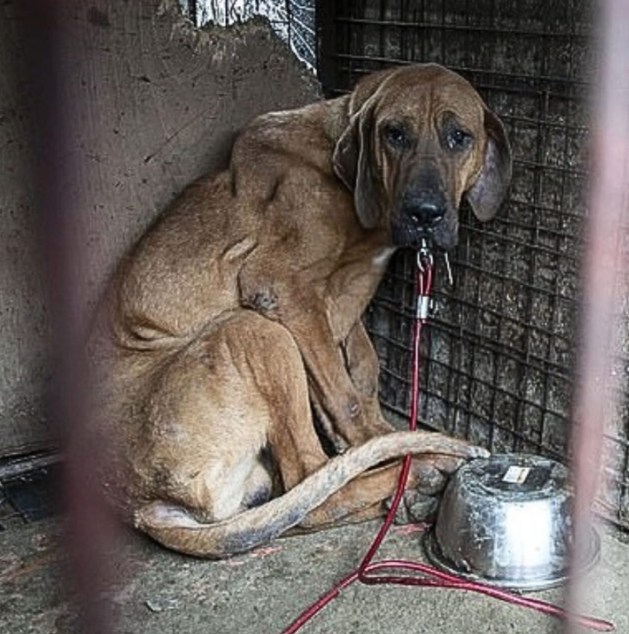Robin was the last dog to be saved from a bleak and heartbreaking situation at a dog meat farm in Yongin, South Korea. Out of fifty dogs confined in cramped, unsanitary cages with fear written across their eyes, Robin stood apart—not because he barked louder or fought harder, but because he was silent. Timid, anxious, and deeply scarred by his environment, he had learned that staying unnoticed was the only way to survive. In a place where noise often brought punishment, silence became his shield.

When rescuers first entered the property, the reality was almost too much to take in. The air was thick with the smell of neglect. The dogs were squeezed into tiny wire cages with rusted bars, no proper flooring, only waste and mud beneath their paws. They had no clean water, no soft bedding to rest on, and no medical attention. Their entire world was made of rusting metal and the constant cries of fear around them. For many, every day carried the terrifying possibility of being taken away and never returning.
Yet Robin survived. His survival, however, came at a cost. He shook at the sound of footsteps, recoiled at even the gentlest touch, and avoided eye contact completely. While some of the other dogs barked or whimpered when people approached, Robin froze in stillness, as if becoming invisible might keep him safe.
This particular farm had been under investigation as part of the wider crackdown on the illegal dog meat trade. Though public opinion in South Korea has shifted and laws are slowly addressing the issue, operations like the one in Yongin continued to exist. Animal welfare groups had been monitoring the site for months, gathering evidence and working with local authorities. At last, the order came to close the farm. Liberation day arrived, and all fifty dogs, Robin included, were spared from the grim fate that had been waiting for them.
For Robin, rescue marked not an ending but the uncertain beginning of a new life. He was transported to a shelter where, for the first time, he had the chance to heal. At first, progress was painfully slow. He would not eat when people were nearby. He huddled in the corner of his kennel, trembling whenever someone tried to comfort him. Even the softest voice or most careful hand made him flinch.
But the staff refused to give up on him. They knew that recovery from trauma is not quick, and that patience is as important as food and shelter. They gave Robin the space to retreat when he needed it, and offered gentle encouragement when he showed signs of curiosity. Slowly, small changes appeared. A slight wag of the tail. A brief glance toward a friendly face. A cautious step forward.

A turning point came when Robin met Daisy, a calm, older golden retriever who had herself been rescued from neglect. Around Daisy, Robin changed. He mirrored her calm behavior, observed the way she trusted humans, and began to follow her lead. She became his silent teacher, showing him that the world could be safer than he had ever known.
The transformation was gradual, but steady. Robin learned to walk on a leash, always staying close to his caregiver’s side. He discovered that human hands could offer comfort instead of harm. He began to take treats, then greeted staff with a wagging tail. One day, he let out a small, hesitant bark—the first sound anyone had heard from him in weeks.
Robin’s journey inspired everyone who met him. He proved that even the most broken spirits can rediscover trust and joy. He reminded people that healing takes time, but with patience and love, it is possible. His story became a living example of resilience, showing that hope can grow even in the darkest circumstances.
Eventually, Robin was ready for the next step. A quiet family with no other pets opened their home to foster him, giving him the peace he needed. At first, he was cautious. But soon, he found a favorite spot by the window where he could bask in the sun and watch the outside world. Every day brought small victories—a nap in the living room instead of the corner, a tail wag at mealtime, a sigh of contentment at bedtime.

Robin’s life today is more than survival; it is proof of what compassion can achieve. He may still carry the shadows of his past, but they no longer define him. He is now a cherished companion, a gentle soul learning to love and trust again, and a survivor whose story has touched people across the globe.
The rescue of Robin and others like him highlights the importance of global awareness and local action. While dog meat farms remain a reality for some animals, progress is being made. Thanks to the tireless efforts of rescue groups, supportive communities, and advocates around the world, countless dogs have been given a second chance.
Robin’s journey—from a silent, terrified dog in a rusted cage to a beloved family companion—delivers a powerful message. Animals are not property. They are living beings with feelings, needs, and the ability to give and receive love. Every one of them deserves the safety and comfort of a caring home.
The hope for the future is clear: a world where dogs like Robin never have to be rescued from places like Yongin. Until then, every rescue matters. Every life counts. And every Robin deserves the opportunity to heal.
If you are considering adoption, fostering, or supporting organizations that protect animals, let Robin’s story be a reminder. Sometimes, one simple act of kindness can change an entire life forever.





